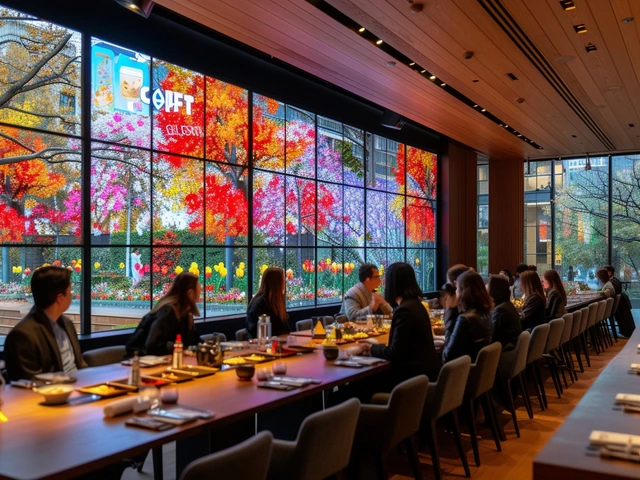Scroll through any business newsfeed and there's one word that keeps popping up—ChatGPT. It's more than just a chatbot. Right now, in 2025, marketers in Brisbane, New York, and everywhere in between are using ChatGPT for SEO, and the results are reshaping how brands show up online. Organic search used to move at a snail’s pace—waiting weeks for search engines to notice your tweaks. Suddenly, with a smart AI like ChatGPT, you’re seeing optimised content, technical fixes, and topic clusters roll out in days, not months. The data backs it: according to an SEMrush industry study published in April 2025, 74% of digital marketers in Australia mention using conversational AI tools for SEO daily. The lazy days of keyword stuffing are over, and AI is helping marketers actually sound human while rocketing up the search rankings.
Why ChatGPT is a Game-Changer for SEO Teams
Staring at a blank Google Doc hoping for inspiration is a thing of the past. ChatGPT’s ability to whip up draft blog posts, brainstorm new keywords, and even edit on the fly is a blessing for content writers who’d rather spend their weekends at a Brisbane café than hunched over a laptop. Need a catchy meta description? ChatGPT churns one out in seconds, adapting to your brand’s voice after just a handful of prompts. That kind of consistency was nearly impossible before. No wonder 61% of SEO teams at Australian agencies say their output of content has doubled in the past year (Digital Marketer AU, May 2025). And we’re not talking cookie-cutter stuff—the best thing about ChatGPT is the way it can tailor each piece of content for intent, tone, and length.
Beyond copy, ChatGPT helps with technical audits. Using the right plugins and integrations (like its tight connection with Surfer SEO, Ahrefs, and Screaming Frog), it highlights broken links, duplicate titles, or missing alt text. If you’re not the techiest in the room, this means you can catch pesky SEO errors before Google does. Still not convinced? Take a look at the table below showing typical improvements in tasks before and after ChatGPT adoption based on a 2025 Agency Survey:
| SEO Task | Pre-ChatGPT (Avg Minutes) | Post-ChatGPT (Avg Minutes) | Productivity Gain (%) |
|---|---|---|---|
| Content Drafting | 90 | 27 | 70% |
| Meta Description Generation | 8 | 1 | 87% |
| SEO Audit Reporting | 50 | 15 | 70% |
SEO isn’t just about speed. ChatGPT is great at picking up on recent industry shifts. It can suggest new semantic keywords—phrases real Aussies search for, rather than what Google told us last year. It scours Reddit threads and social chatter almost instantly, so trending queries or slang don't slip through the cracks. Whether you’re running a one-person digital shop or managing content for a big-brand ecommerce site, having this real-time pulse on the web is a crazy advantage.
The AI isn’t perfect. You still need to fact-check, update statistics, and review for tone-hiccups. But it’s turned dreary, manual research into an actual creative process—and delivered a lot less carpal tunnel syndrome.

Tips for Supercharging SEO with ChatGPT
Some folks treat AI as a magic wand, but that’s how you get generic, easily spotted AI content that tanks your rankings. You want that blend: put your brain to work and let ChatGPT handle the heavy lifting behind the scenes. Try these practical tips for turning AI into your SEO sidekick instead of just another tool.
- Prompt smart, not hard: Instead of bluntly saying, "Write a post about shoes," anchor your prompt in your niche and audience. Say, "Draft a blog post for eco-conscious Brisbane runners comparing sustainable sneaker brands." That gives you a higher quality, publish-ready draft.
- Layer your requests. Ask ChatGPT to suggest FAQs for your main topic, then use a follow-up prompt to generate schema markup. This speeds up both your writing and technical on-page work.
- Analyse search intent first. Use ChatGPT to break down whether a keyword signals a buyer ("buy running shoes Brisbane") or a browser ("are vegan sneakers better?")—and match your content style accordingly.
- Cluster content ideas. Ask ChatGPT for pillar content topics, then request a batch of supporting articles. This builds topical authority, which Google’s AI-powered algorithm loves in 2025.
- Rewrite for tone and voice. Train ChatGPT with 2-3 paragraphs of your favourite posts, then have it rewrite drafts you’ve made. You’ll keep your unique style—even if you’re publishing at scale.
- Double-check data. ChatGPT is fast, but sometimes it invents numbers. Always compare AI advice against trusted industry sources—especially when quoting stats or studies.
- Tune meta titles and descriptions. Use ChatGPT to generate several options, then A/B test in Google Search Console for the ones with the best click-through rates.
- Draft email pitches and outreach. Need backlinks? Use ChatGPT to tailor outreach emails based on the target site and topic, instead of copying and pasting stale templates.
- Automate tedious tasks. Pair ChatGPT with tools like Zapier to auto-generate content based on new product launches, saving you hours of grunt work a week.
Marketers who push beyond just article writing are seeing big payoffs. For example, local SEO agencies are combining ChatGPT with Google Business Profile posts, creating tailored updates and responses to reviews at lightning speed. Others use AI to produce YouTube video scripts that are packed with keywords, then repurpose the script content as a blog post, SERP snippet, or social caption—wringing every bit of value from a single topic. Start small, experiment, and make AI part of your team, not your replacement.

Where ChatGPT-Powered SEO is Heading Next
The buzzword for 2025’s search landscape is conversational. Google’s Search Generative Experience (SGE) is designed to handle natural language questions, meaning what worked in 2020 (think keyword lists, directories, or clunky Q&A pages) just doesn’t cut it now. That’s why ChatGPT for SEO feels like having a little crystal ball. It predicts not just what people are searching, but how they ask, what they really mean, and what answer will satisfy their intent.
One area seeing explosive growth is in voice-optimised content. Research published in June 2025 by BrightLocal showed that 56% of Aussies aged 18–34 are using voice search weekly (up from just 29% in 2022). That shift means your content has to read more like a conversation, less like an encyclopedia. ChatGPT can draft FAQs and featured snippet answers, so you’re ready for both text and voice queries. Marketers in Brisbane’s hospitality sector are cashing in by rolling out conversational, localised content for restaurant menus, tour guides, and event updates, winning the featured snippet spots for voice searches done on the go.
Another trend to watch: automated A/B testing. Because ChatGPT produces a sea of variants quickly, agencies are running 10 different meta title experiments in a week and finding out what really hooks an audience. Before, most marketers barely got around to running one or two title tests per month. This makes sites far more agile and responsive.
Of course, as AI-generated content skyrockets, Google’s spam filters get sharper. In 2025, simply using AI isn’t enough—you need that spark of human review, fact-checking, and local insight. The most successful teams are blending machine speed with creative judgement, and they’re seeing longer average session durations and better retention. A Sydney-based retail brand reported a 43% increase in organic traffic six months after switching to a ChatGPT content workflow, but all their posts were still signed off by a human editor before going live.
The best part about this new era? Smaller brands and solo consultants are on a level playing field with the big guns. When you combine the right tools, a keen sense for audience needs, and just a dash of that Brissy optimism, ChatGPT is opening doors that used to be welded shut for anyone without a six-figure marketing budget.
If you haven’t tried weaving ChatGPT into every step of your SEO process, 2025 is the year to give it a go. Your competitors probably already are—and in digital marketing, getting left behind is the only thing that still happens overnight.





